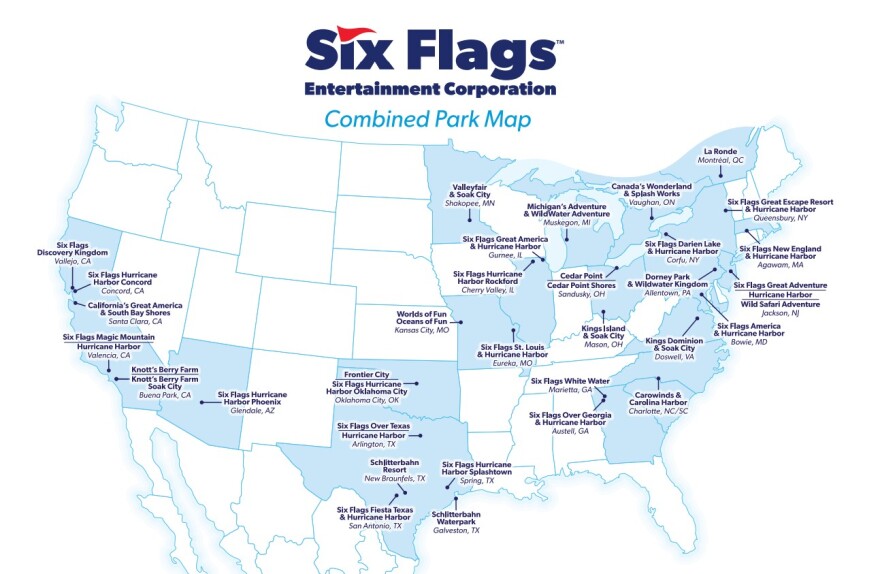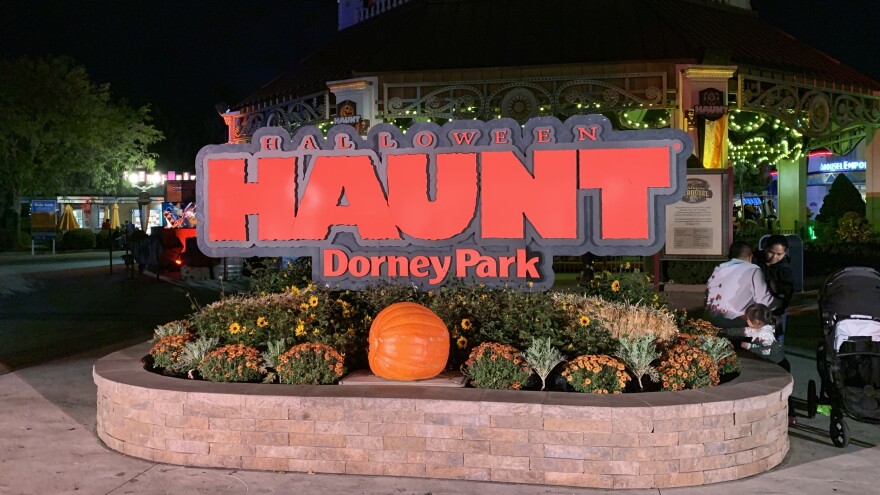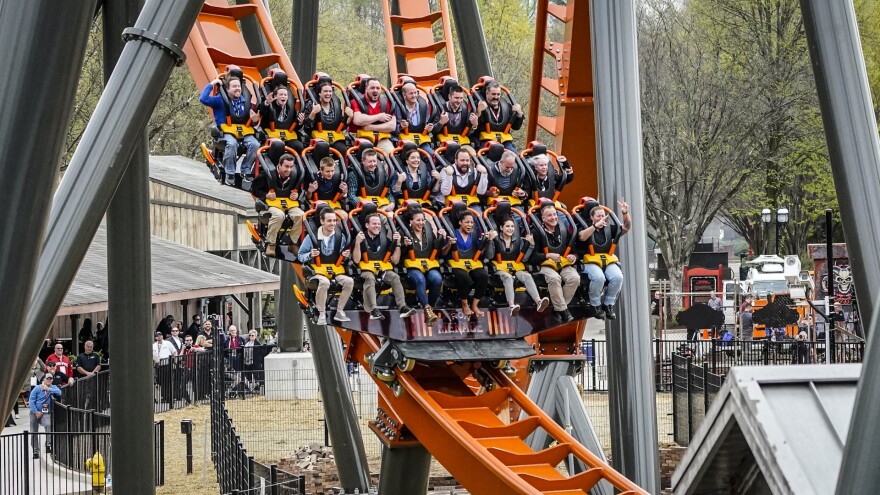SOUTH WHITEHALL TWP., Pa. — Haunted attractions and bone-chilling entertainment may not be the scariest thing about Dorney Park this fall.
There could be big trouble ahead for the venerable Lehigh Valley amusement park — and many other Six Flags properties, a longtime industry analyst predicts.
Dennis Speigel, president of International Theme Park Services, said Six Flags, which merged with Cedar Fair last year to become Dorney Park’s parent company, is sitting on roughly $5.5 billion in debt after a season marked by bad weather, rising costs and attendance declines.
“Cedar Fair was what I call the ‘wind beneath the wings’ that was coming in to lift Six Flags up,” Speigel told LehighValleyNews.com. “Really they were on a downward spiral and on the precipice of bankruptcy. They were severely hurting.
“Unfortunately, the plan that was put together … it just didn’t work.”
Speigel now believes Chapter 11 bankruptcy and the sale of some parks could be inevitable for Six Flags, and that such a move would likely mean “everything is on the table.”
“The biggest 20,000-pound gorilla hanging over the head of this company now is their debt,” he said.
“They're not pulling this plane out of the nosedive, and they can't. The only way they can do this is to, in my opinion, reimagine the company from every aspect, and that includes the number of parks.”
How we got here
On July 1, 2024, Six Flags Entertainment Corp. and Cedar Fair Entertainment Co. (then Dorney Park’s parent) completed a merger of equals, forming what was said to be the largest and most diverse amusement park operator in North America.
The combined company retained the Six Flags name and began trading on the New York Stock Exchange under the ticker symbol "FUN.”
But despite the merger's initial promise, things quickly spiraled. In May, it was announced that Six Flags America and Hurricane Harbor in Bowie, Maryland, would close Nov. 2.
Land surrounding King’s Dominion in Virginia also is going up for sale, and the company said California’s Great America is expected to close at the end of 2027.
Continued headlines on operational inefficiencies — notably tied to Cedar Point and the delayed opening of the long-awaited Top Thrill 2 coaster in Sandusky, Ohio — spilled over into this summer, when the park’s latest attraction, tilt coaster Siren’s Curse, repeatedly left riders stranded, raising safety concerns.

And in August, during the company’s second-quarter earnings call, came this report: Attendance dropped 9%, season pass sales were off 8%, revenue was down $100 million, with $500 million in debt.
On the call, Six Flags President and CEO Richard Zimmerman also announced he would step down at the end of the year. And during the call, he referenced Dorney Park as “underpenetrated” for the season, implying lower attendance than anticipated.
Speigel said there were numerous internal issues and external factors and slip-ups that also have contributed to the downward spiral.
Among them were key decisions for the company to “hang its hat” on the sales of an MVP pass (one price unlocking access to 40+ parks), along with a decision to add surcharges, or separate admission pricing, for this year’s Halloween attractions.
“They really hung their hat that this prestige pass was going to [be] what I call the quote, unquote, ‘Biggie fry,'” he said. “When you go through the McDonald’s window, you want the biggie fry on top of that? No, I’m happy with the regular fry.
“Well, the regular fry is your regular season pass. The biggie fry that they threw out there and they hung their hat on was people in Allentown were going to spend another $40, $50, $60, whatever it was, on a season pass that would get them into Knott’s Berry Farm or Magic Mountain in California.
“Well I’ve gotta believe, and I think they do now, that people don’t wake up in the morning on a Tuesday and say, ‘Let’s go to Magic Mountain. Let’s ride there tomorrow. Go 2,000 miles.' You know, they just don’t do that. That was a big problem that while it looked good on paper and it was a value, you’re not going to all 42 [parks].”
"People don’t wake up in the morning on a Tuesday and say, ‘Let’s go to Magic Mountain. Let’s ride there tomorrow. Go 2,000 miles.' You know, they just don’t do that."Dennis Speigel, industry analyst

Attendance declines and local impact
Speigel pointed to additional factors that led to declining attendance at parks like Dorney this year, particularly changes affecting their most loyal patron — the seasonal pass holder.
For the first time, all parks will be charging additional fees for access to Halloween attractions — a move Speigel said is aimed at recovering some of their lost revenue.
“I think it's going to backfire on them, because typically, you sell your majority of season passes, beginning October through early January, February … around the holidays.
“And I think people who are users are going to pull back. Maybe you could see 10 to 15 percent maybe say, ‘You know, I'm not going to do that this year. I'm going to wait and see what they do, because they've changed too many things too many times.'"
Online chatter among Dorney fans has echoed that sentiment.
A post inside a dedicated Facebook group dubbed the “Dorney Park Connoisseurs” had more than 320 comments after asking, “How many are not renewing the pass and waiting to see what else changes?”
Discussions throughout the season also revolved around closed food stands, long wait times, and rides disappearing without explanation.
That loyal season pass base feels like they’re paying more for less, Speigel said, a move dangerous for a regional park that relies heavily on repeat visitors.
“That repeat visitation is driven by what we call Capex, the capital expansion money that’s the new roller coaster or park ride, or whatever food stand or picnic area or swimming pool, whatever they might put in, it’s driven by Capex," he said.
“When you stop investing in the parks, the people stop coming back. It slows down and it has a definite negative impact. We’ve seen that and we know that in the industry. We’ve known it for years. You have to keep investing.”
“When you stop investing in the parks, the people stop coming back. It slows down and it has a definite negative impact. We’ve seen that and we know that in the industry. We’ve known it for years. You have to keep investing.”Industry analyst Dennis Speigel
Allentown resident Dan Kroll, a season pass holder for 10 years, said this season at Dorney felt different, with the park closed without explanation some Wednesdays, and others where crowds were noticeably thin.
“My perception from someone who has had a season pass for 10 years is it seems this year they decided to let things play out and see what happened instead of making any firm decision about how these two entities – Six Flags and Cedar Fair – work together," he said.
“I figure maybe this is what they’re doing, but the problem in doing that and taking that year to figure things out is that it looks as though the parks are neglected … by not communicating with the public, it’s just not a good look.”
Kroll said there were times at the park this season where food stands haven’t been open, or others where options were suddenly limited.
“They had a featured entree at the retro diner (Coaster’s Drive-In), but they slashed that. It’s now standard chicken tenders, burgers and basic offerings,” he said.
“Even in terms of quality, certainly no one is going to an amusement park for a Michelin star meal," he acknowledged. "But not only have they raised prices, the quality has gone down. There are times the food hasn’t been hot, like it’s been sitting all day."
“I waited 40 minutes for a grilled chicken sandwich at the Chicken Shack, and I wasn’t the only one. There was a whole line of people waiting for their sandwich," he said.
Overall, he said, “everything seems to be an afterthought this year and it just looks like something isn’t right," from the parking to the ticket booths and beyond.
Tina Jagielski, the author of the post on Facebook, agreed. She said the changes for Halloween, in particular, "felt poorly executed and would have been better suited to begin next season."
She also cited "troubling incidents" in the park this summer, including video of a recent fight in which a guest appeared bloodied and injured.
"Situations like this highlight what happens when a park is not properly managed: guests lose respect for the environment, and the atmosphere quickly deteriorates," she said.
A critical fall season ahead

If Six Flags can’t pull out of its financial dive, Speigel believes Chapter 11 bankruptcy and the sale of some parks could be inevitable.
“I still think you don't get out of this without selling off some parks. Does that mean that Dorney Park stays or goes? I don't know."Industry analyst Dennis Speigel
“I still think you don't get out of this without selling off some parks. Does that mean that Dorney Park stays or goes? I don't know.
“You would have to look at each market, each park, do huge due diligence on each park in its market, and decide you as a new owner or operator or however restructured, who you want to keep and what it's going to be like in the future,” he said.
Potential buyers could include private equity firms or smaller companies looking to expand their portfolios.
But it wouldn’t be easy, Speigel cautioned.
“You’d have to take all of them, put them under the microscope, look at them individually and then figure out what their contribution could be to the new company who would be interested in buying them.
“It’s going to be a very elaborate and detailed process, and I think you’ve got to look at every park.”
For now, Speigel says the industry is in “wait and see” mode as parks head into Halloween, traditionally one of the biggest revenue drivers of the year.
“Everybody is hoping and praying for a good Halloween, and hopefully we have this kind of weather that carries through the remainder of the season and up to the end of year in some locations.”
By mid-October, he said we’ll know what kind of year it’s been — and what comes next.
And while South Whitehall Township Manager Tom Petrucci had no comment on the park’s possible future, Alex Michaels, president and CEO of Discover Lehigh Valley, spoke to Dorney’s place in the region.
“Generations of location families, school groups and season pass holder have built traditions at the park each year, and those visits ripple through our economy."Alex Michaels, President & CEO of Discover Lehigh Valley
“Dorney Park has been welcoming guests since 1884, making it one of the nation’s oldest continuously operating amusement parks,” he said. “That legacy matters here.”
Michaels noted that “generations of local families, school groups and season pass holders have built traditions at the park each year, and those visits ripple through our economy, supporting local jobs, hotels, restaurants, and small businesses across Lehigh and Northampton counties.”
From a tourism standpoint, he described Dorney Park as one of the Lehigh Valley’s anchor attractions.
“It consistently draws day trips and overnight stays, helps extend our season with special events, and serves as a gateway for visitors to discover more of what the region offers, historic downtowns, outdoor recreation, arts, and culinary experiences,” he said.
The introduction of new attractions in recent seasons, such as Iron Menace, has only broadened its appeal, he added.
“Like many long-standing destinations, Dorney Park has navigated change over the decades and continued to adapt. Regardless of any corporate developments, our focus at Discover Lehigh Valley remains the same: promoting a healthy, diversified visitor economy and working closely with our attractions and community partners to ensure guests have great experiences here.”
Several attempts to reach Six Flags spokesman Gary Rhodes for comment were unsuccessful, though the company acknowledged during its latest earnings call it was evaluating its full portfolio.
“We’re also engaged in evaluating the rest of what we think is potential, given market conditions and how quickly we can move to potentially divest other things that we would consider noncore,” Zimmerman said.


